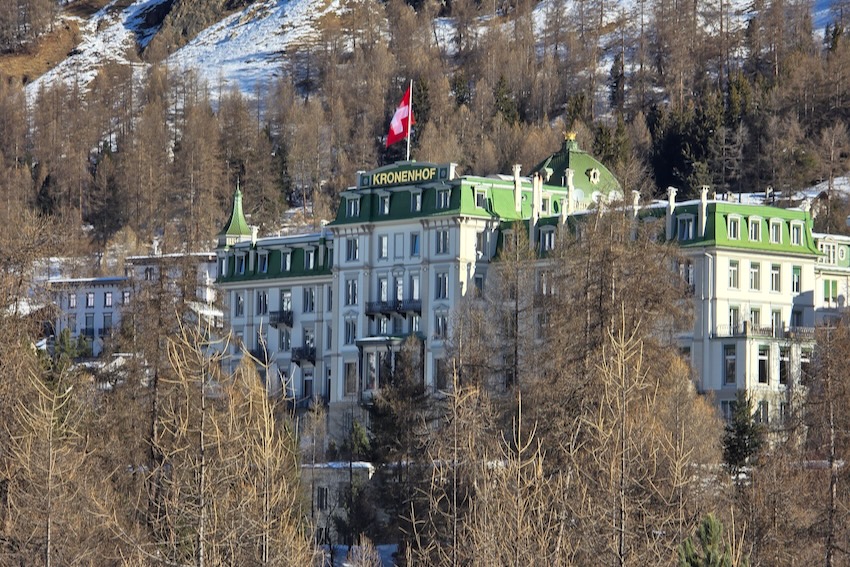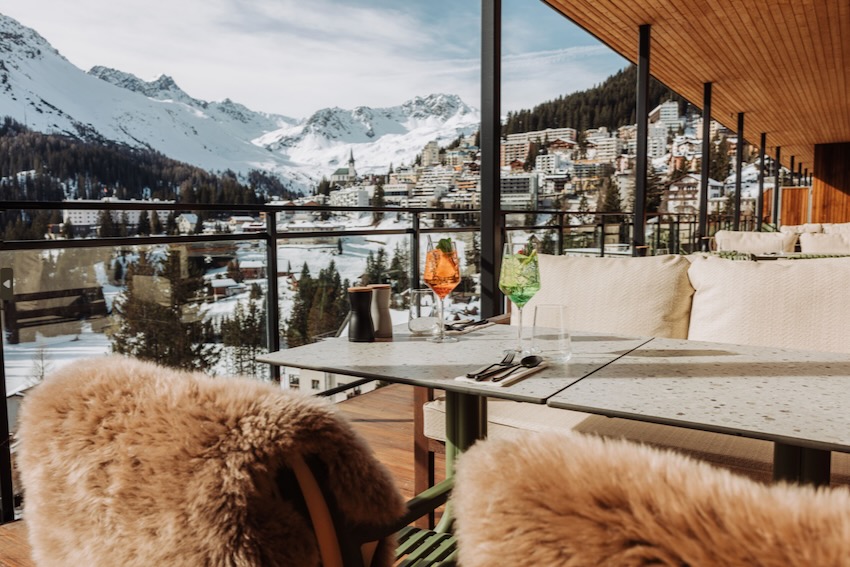
Award-winning travel journalist and published author, Mark Frary, looks at how Switzerland is managing tourism with its Swisstainable campaign, and what it means for hotels and their guests in tourist hotspots across the country.
If you visit one of thousands of hotels, tourist attractions, transport providers and other travel companies in Switzerland this year, you might spot a small green badge with a retro design showing the Swiss Alps and the portmanteau word Swisstainable.
The badge indicates that you are staying in a hotel or using a service that is committed to a journey towards sustainability.
The badge shows that the business is part of the Swisstainable programme, launched in 2021 by the Lucerne University of Applied Sciences and Arts, the Swiss Tourism Federation, and Switzerland Tourism. But Swisstainable is not yet another sustainability accreditation scheme.

Véronique Kanel, deputy head of corporate communications at Switzerland Tourism, told Sustainable Hotel News, “It provides a national, shared framework that integrates and encourages existing sustainability initiatives within the tourism sector. The programme helps businesses continuously improve their sustainability practices and to make them both visible and tangible. The Swisstainable label helps guests from around the world make more informed travel choices in Switzerland — promoting a more sustainable form of tourism.”
Kanel added, the scheme “appeals to sustainability conscious visitors, especially from key markets where this aspect is a growing decision factor in choosing a travel destination”.
She said the programme is in line with the Alpine nation’s sustainable development strategy out to 2030. You can read more about that here.
“Promoting sustainability helps protect the country’s landscapes, biodiversity, and mountain ecosystems – all central to the tourism offering,” she said. “It also supports local communities, reduces seasonality, and encourages long-term value creation over short-term volume growth,” Kanel said.
Since its launch, almost 2,500 partners have joined the programme and are assigned to one of three levels – committed, engaged or leading.
Committed partners have made initial assessments and have implemented their first sustainability measures. Engaged partners have achieved external accreditation with regular audits. Leading partners, of which there are more than 500, have comprehensive certifications for all their activities.
Every year since its launch, the government and Switzerland Tourism have promoted schemes under the Swisstainable banner. One winter campaign promoted ‘Swisstainable destinations’ for winter sports to young Europeans, while in June 2023, SBB (Swiss Federal Railways) – a leading partner in the programme – encouraged people to take a ‘Swisstainable summer’ by train.
Some 15 destinations in the country are part of the scheme, including the city of Basel, the Entlebuch Biosphere nature reserve and the ski resorts of Saas-Fee, Zermatt and Engelberg-Titlis.
Almost half of the partners in the programme are hotels. You can check out a list of hotels in the programme here – it also has the level of Swisstainable the property has so far achieved with 3 representing ‘leading’, 2 representing ‘engaged’ and 1 representing ‘committed’. There are also some restaurants on the list.
Kanel says hotels benefit from the opportunity to take measures that can have an impact on economic aspects of a business, “such as taking measures to improve the energy efficiency of buildings, reduce food waste, or have a wider impact on communities, such as sourcing and promoting local products, or introducing measures to improve the employees’ well-being, which in turn can have a positive impact on [their] turnover and reputation”.

One such hotel has recently joined the scheme as a ‘committed’ partner. The Grand Hotel Kronenhof in Pontresina in the canton of Graubünden, in eastern Switzerland, is a neo-Baroque hotel established in 1848 as a health retreat with guests looking to enjoy the clear mountain air.
Several of the Kronenhof’s event spaces, including the historic wine cellar with its enormous wine barrels, and the lobby lounge with its impressive trompe l’oeil ceilings by Otto Haberer, are also partners in their own right.
Karolina Mazur, experience curator at the hotel and its sister property the Kulm Hotel St Moritz, says sustainability is one of the priorities for the owners.
“When you rely on tourism, particularly with snow, you want to make sure that’s still here in 100 years,” said Mazur. “You can see the glacier from the hotel windows, so we need to take care of sustainability if we want to have this panorama for the next 100 years.”
The group’s sustainability initiatives cover energy and water use, recycling, waste management and more.
“The biggest investment we made in the past year is the solar panels you see on the top of the hotel to help lower oil consumption. Other processes are to reduce water usage as much as possible. We are gradually doing this in all the rooms in the Kronenhof by fitting the showers with filters to reduce the amount of water.”
The Kronenhof is also reducing food miles in its restaurants. “Our clients expect us to serve only seasonal food and only to have things which come from the region,” she said.
Mazur says that the Kronenhof and the Kulm St Moritz have an ambition to obtain EarthCheck accreditation, which would catapult them into the highest Swisstainable tier. “It’s a good ambition because otherwise if we don’t go forward with this, our competitors will,” she added.

Hotel Faern Altein, part of the Faern Resorts group, in the Swiss mountain town of Arosa is also a ‘committed’ Swisstainable programme partner.
The group’s marketing executive, Eszter Németh, told Sustainable Hotel News, “As a hotel in the Alps, we depend on the landscape, the local community, and the traditions around us. Taking care of these is essential if we want to operate responsibly and keep the destination strong for the future.”
She says that the programme aligns with the hotelier’s beliefs: that running a hotel in the mountains comes with a responsibility to protect the environment and the community and that guests are increasingly expecting hotels to be sustainable.
The hotel is reducing single-use plastics with refillable amenities and glass water bottles, switching to LED lighting, using motion sensors and smart room-temperature controls, and improving waste separation and recycling.
“In our restaurants, we prioritise local and seasonal products to reduce transport distances and support regional producers. We also encourage eco-friendly mobility: public transport partnerships, EV chargers, and access to bikes and e-bikes,” she said.
These are just the first steps and that the biggest impact will come from long-term decisions. “Sustainability is now integrated into all our CAPEX and furniture, fixtures and equipment planning, as well as supplier selection,” Németh said.
“When we renovate or replace equipment, we look at energy performance, lifecycle costs, and responsible sourcing. We set reduction targets for waste, energy, and water and monitor them internally so we know where to improve. Over time, this helps us operate more efficiently and move toward higher levels within the Swisstainable framework.”
Image: Philipp Düsel on Unsplash

